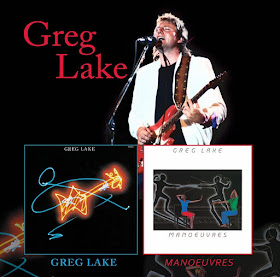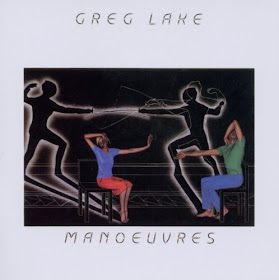ELP’s musical pedigree was impressive, the band considered a true rock “supergroup” when it formed – singer/guitarist Greg Lake came from the aforementioned King Crimson, drummer Carl Palmer from cult faves Atomic Rooster, and keyboardist extraordinaire Keith Emerson from classical art-rockers the Nice. Along with Yes, ELP was prog-rock royalty, helping define the genre and dominating the charts throughout the 1970s with subsequent albums like 1971’s live Pictures At An Exhibition (#10 US/#3 UK), 1972’s Trilogy (#5 US/ #2 UK), and 1973’s Brain Salad Surgery (#11 US/#2 UK). The band’s first eight albums achieved Gold™ Record status, with seven of them charting Top 20 or better.
But the ol’ black magic had begun to fizzle out by the time of 1978’s Love Beach which, although the album would eventually be awarded a Gold™ Record, failed to chart in the Top 30 at the time. The high expense of touring left ELP virtually broke, and the individual band members were exhausted and couldn’t stand each other’s company. ELP broke up (temporarily) in ’79, leaving frontman Greg Lake wondering what he would do next. Lake did what any good muso would do, launching a solo career and forming the Greg Lake Band. The guitarist released two solo albums – 1981’s self-titled debut and 1983’s Manoeuvres – both of which experienced only modest commercial success. Reissued by Cherry Red Records as a two-disc set with four rare bonus tracks, these unfairly obscure and long out-of-print albums are worth another listen.
Greg Lake’s Debut LP
Lake’s self-titled debut was recorded partly in the United States and partly at his own studio in the United Kingdom. In Los Angeles, Lake worked with members of Toto, with backing provided by guitarist Steve Lukather, bassist David Hungate, and drummer Jeff Porcaro, as well as studio guests like King Crimson drummer Michael Giles and E Street Band saxophonist Clarence Clemons. Lake’s band on the UK sessions included bassist Tristian Margetts (Spontaneous Combustion), keyboardist Tommy Eyre (Joe Cocker’s Grease Band), and drummer Ted McKenna (Tear Gas, Rory Gallagher). Legendary Irish blues-rock guitarist Gary Moore lent his talents to both of Lake’s solo efforts.
In the liner notes to Greg Lake, the guitarist refers to his “creative turmoil” at the time, and states in retrospect (and I’m paraphrasing) that he should have further explored his prog-rock roots rather than flitting from style to style as he does on this debut. Although Lake’s performances are exemplary, and his backing musicians are top-notch, the material often suffers from focus and, at times, from lack of understanding. For instance, the album-opening “Nuclear Attack” was written by Moore, and his fingerprints are all over this performance (Moore would subsequently release the song on one of his own albums). A scorching, at times symphonic heavy metal flamethrower, Moore’s fretwork is stunning, but Lake’s voice wasn’t built to deliver this sort of molten slag, and it shows…it’s an altogether solid song, but Lake is no Ronnie James Dio, if you know what I mean...
Dylan’s Love You Too Much
A more comfortable fit is “Love You Too Much,” an unfinished song that Lake solicited from Bob Dylan. The Scribe gave the tune to Lake to complete, and he did so nicely, retaining enough of Dylan’s original phrasing and melody to make the song sparkle while pumping up the performance on steroids with his impressive vocals, wonky guitarplay, ambitious instrumentation, and an overall breathless reading. Lake’s original “It Hurts” is an ELP-tinged ballad with his elegant acoustic guitarplay providing counterpoint to a wiry electric guitar. “Black and Blue” veers dangerously close to Fleetwood Mac’s stylistic turf, both lyrically and musically, complete with fey vocals and lovely harmonies – either a good thing or bad depending on your perspective – but a sound probably five years past expiration either way.
The rocker “Retribution Drive” was a bit commercial in orientation, perhaps, but does offer tasty, soaring guitars and dense rhythms and although it has a pretty cheesy middle section where Lake croons out his lyrics, the strident instrumentation and overall sonic dynamic should have made the song a chart hit. Definitely a product of the 1980s, “The Lie” is part rocker/part ballad with overstuffed production and busy instrumentation that almost buries Lake’s vocals at times. It sounds like Lake has gone MOR with “Let Me Love You Once,” a meager ballad that sounds more like Toto than ELP (and no, that’s not a good thing). Of the bonus tracks, an inspired cover of Smokey Robinson’s “You Really Got A Hold On Me” swings nicely on Lake’s vocal chops while “You’re Good With Your Love” is a poppy, new wave construct that Lake never really pulls off.
Greg Lake’s Manoeuvres
Although Greg Lake, the album, experienced moderate chart success (hitting #62 in both the US & UK), Chrysalis Records was expecting a hit single and major league sales like ELP enjoyed, and the label was disappointed by the outcome. While Lake was still trying to find his solo musical identity, he had nevertheless swung for the fences, so it wasn’t for lack of trying that the album didn’t blow up. Dutifully, Lake had taken his band out on the road, touring in support of his solo debut. Comprised of bassist Margetts, keyboardist Eyre, and drummer McKenna, the Greg Lake Band developed a natural musical chemistry while on the road, the experience benefiting them greatly when they entered the studio to record Lake’s second album, Manoeuvres.
With an experienced and stable group of musicians behind Lake (instead of the hodge-podge of talents assembled to record the debut album), and with Gary Moore back in the studio to lend a hand, Manoeuvres is a vastly different album than its predecessor. Yes, the bombastic title track – a Lake/Moore co-write – is the sort of metal-edged hard rock that Moore was pursuing at the time, but toned down somewhat to create a more appropriate showcase for Lake’s lofty vocals. “Too Young To Love” is a mid-tempo rocker, Moore’s scorching fretwork and the band’s crashing percussion complimenting Lake’s vocal performance, which ranges from what is basically a spoken word delivery to shimmering, ethereal phrasing. Lake’s vocal gymnastics are match by the instrumentation, Moore’s frenetic guitarplay flying high above the busy rhythms.
I Don’t Know Why I Still Love You
Lake’s “Paralysed” is a curious construct, at once both the sort of moody, strident new wave music being made by contemporary bands like Berlin and Eurythmics at the time, but with guitar-driven hard rock roots. Lake’s vocals are emotionally-charged and slung low in the mix while Moore’s six-string squeals punctuate the lyrics. Another Lake/Moore co-write, “Don’t Wanna Lose Your Love Tonight” would have been the obvious choice to release as a single, and given the era, it could have scored big-time. A mid-tempo rocker wearing new wave fringe, the song offered Lake’s heartfelt lyrics, Moore’s imaginative guitarplay, and the band’s rock solid rhythmic foundation.
“Someone” provides the right framework for the singer’s best vocal performance on Manoeuvres. A mix of proggy ELP and poppy new wave melodies (think Simple Minds or Icehouse), Lake’s voice drives the haunting ballad while his classical-flavored acoustic strum provides a nice contrast with the lush instrumentation; with a little promotional push, “Someone” could have been another hit single. “I Don’t Know Why I Still Love You” is a beautiful, tearjerker of a ballad, with Lake’s delightful vocals soaring high above bittersweet instrumentation while “It’s You, You Gotta Believe” is a proggy, keyboards-driven ballad with a whimsical soundtrack that nevertheless could have used a bit more guitar. The bonus track included here, “Hold Me,” is a good song that would have fit perfectly within the scope of the original album, the song a lightweight melodic ballad with bright instrumentation, Lake’s warm (double-tracked?) vocals, and classically-inspired fretwork.
The Reverend’s Bottom Line
Greg Lake was no world-beater as a solo artist, and after Manoeuvres failed to chart, the guitarist accepted former ELP bandmate Carl Palmer’s 1983 invite to join Asia as bassist John Wetton’s replacement. A year or so later, when Wetton returned to the fold, Lake hooked up with Keith Emerson and journeyman drummer Cozy Powell in the ill-advised Emerson, Lake & Powell (ELP, geddit? Did they have t-shirts left over or what?). That band released a single, modestly successful album in 1986. Emerson, Lake & Palmer would reunite in 1991, releasing a pair of albums, including 1992’s critically-slagged Black Moon, and the band would tour sporadically throughout the ‘90s and ‘00s.
For Greg Lake, though, he seemingly set aside any further dreams of a solo career. Aside from a handful of late ‘80s demos recorded with Asia’s Geoff Downes, which were released in 2015 as Ride The Tiger, Lake largely stayed within the ELP universe. With these two solo albums, though, Lake experimented with different sounds; most notably, the melodic rock found on Manoeuvres would be extremely influential on a generation of European bands. Neither of Lake’s solo albums are earth-shaking recordings, but they’re solid efforts by a talented instrumentalist and songwriter and deserve to take their place as part of the rich ELP legacy. Grades: B- for Greg Lake, B+ for Manoeuvres (Cherry Red Records, released February 5, 2016)
Buy the CD from Amazon.com: Greg Lake's Greg Lake/Manoeuvres
Related Content: Emerson, Lake & Palmer's A Time and A Place CD review




No comments:
Post a Comment
Note: Only a member of this blog may post a comment.